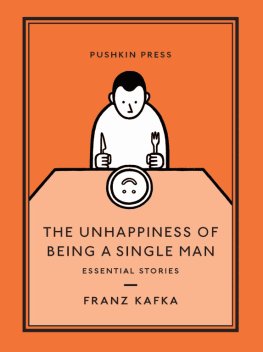
Alois Hotschnig
Maybe This Time
I love Kafka and here we have a Kafkaesque sense of alienation not to mention narrative experiments galore! Outwardly normal events slip into drama before they tip into horror. These oblique tales exert a fascinating hold over the reader.
The Same Silence, the Same Noise
Whenever I left the house, they lay on their jetty and when I came back, hours later, they were still lying there. In the sun, in the shade, in the wind and rain. Day in, day out, every day. There were two gardens of empty, rundown houses with a few trees and hedges between us. Reeds and driftwood were washed up along the shores. Their jetty was no different from the others. A fence of wooden planks protected them from the wind and their neighbours eyes. A pot of lobelias sat on a shelf attached to the planks. Behind it, a plastic palm tree waved above the water. This tree belonged to the little girl one jetty over. The girl couldnt get enough of climbing up and jumping into the water, going under and resurfacing, screaming and going wild with excitement.
My neighbours seemed as indifferent to the childs game as they were to all their surroundings. Nor did anyone appear to take any interest in them. No one ever paid them any attention.
They lay so peacefully on their deckchairs and for a time I assumed they must be happy. But after a while I began to wonder if they enjoyed their sedentary lives. And with each passing day I found it harder to bear the sight of their dogged indolence.
Through my binoculars, I saw that they were younger than I had reckoned from a distance. Now they appeared not exactly young, but prematurely aged, perhaps. I wondered why these people appeared so familiar. And I wondered why I wanted to approach them, even though I never did.
Their idleness disturbed me. But they seemed content. It was as if, having found each other, they had accepted the way things were. Evidently they had already said all there was to say to each other. They never spoke, unless it was through the signs and symbols they traced in the air with their hands. Not once, however, did the woman ever glance towards where the man pointed.
They lay next to each other on their deckchairs, arms by their sides, legs bent or straight. For hours they didnt move, not even to wave away the mosquitoes or scratch themselves. Every day, every night, always the same. Their stillness made me feel uneasy, and my unease grew until it festered into an affliction I could no longer bear. At first, I had thought them part of the idyll I had come here to find, but now their constant presence irritated me. When I realized how easily one could see into my house from their jetty, I felt annoyed, caught out, exposed. Under surveillance, even. Yet I was the one who never let them out of my sight. Whenever I left the house, I looked over towards them, and if ever they werent there when I came back, I couldnt relax until they returned. I now thought of them more frequently and more intensely than was good for me, and I began to feel that I was intruding on their territory. They made this clear to me. Or this, at least, is what I believed I could read in the mans expression whenever we caught each others eye.
In the morning when I sat down to breakfast on my verandah, he was already staring at me. Throughout the day, not one of my movements escaped his notice. Not once, however, did he feel obliged to offer the slightest acknowledgement. His behaviour exhausted me, but it also impressed me. I even welcomed it, since I wasnt seeking contact either. Yet, because his eyes continually scrutinized me, I was always just on the point of greeting him. But then again I was never quite sure if he was actually looking at me or simply staring into space and so I stopped myself each time. As the newcomer, I didnt want to start off on the wrong foot with my neighbours. For a while I tried hard, no doubt too hard, to get their attention. But they gave no response. Initially I put this down to possible visual impairment, until one day I saw them waving back at someone in a boat out in the middle of the lake. Their failure to greet me was clearly deliberate. Still, I wouldnt have wanted it any other way. After all I had chosen this area and this house for peace and quiet and solitude. I had found all of this here and it did me good. But it was awful too because I wasnt used to it. And these people ended up tormenting me, even though they also only wanted to be left alone.
I drew closer to them because they rejected me. Rejection, after all, is still a kind of contact. To show them that I posed no threat, that I wasnt interested in meeting them, I drew my curtains whenever the man glanced towards my house. I even closed the shutters if I thought they might be watching me from their jetty. And yet, all the while, I knew that what I took for intrusiveness was really pure indifference.
This was their way of showing me that for them I didnt exist and that, in truth, I was the interfering one, if there was, in fact, any interference to speak of. This indifference was fine with me. But then again it wasnt, because I didnt understand what I could have done to deserve such a slight. When one day a storm battered our shoreline and the two of them remained motionless in their deckchairs, without even responding to my offer of help, I finally realized that becoming good neighbours was out of the question.
Not even a downpour could drag these two from their routine, which they pursued with determination as if they were fulfilling a duty.
Sometimes the man bolted out of his chair, startled, and hurried down the steps that led into the water amongst the reeds. He leant with both arms on the railing, bracing himself against some unknown danger. He stopped dead and stood there for hours on end. Once in a while, something moved in the reeds, circling and creating a whirlpool in the water. Then, suddenly and unexpectedly, he turned and headed back to his chair, where he made himself comfortable and lay still until night fell.
Behind the couple, the plastic palm swayed in the wind and the girl, laughing and screaming, jumped into the water again and again. I watched her and indulged in a secret protest against my neighbours lethargy.
The sun rose and set. Nothing changed, only my agitation grew. I decided to observe them even more closely to calm my unease, as if I no longer had a life of my own but lived only through them. At night, every now and then, there was a sound of crying, like the whimpering of a child. It was carried by the wind from the direction of their house, then faded away, only to be heard again when I had stopped thinking about it. The sound was soft and unobtrusive, but loud enough to interrupt any conversation I might be having with a guest, who, from that moment, would listen intently for that strange noise.
I didnt want to talk about it and I couldnt explain it, so I would leave the room under some pretext or other every time the sound started. Either that or I would noisily rearrange the glasses to cover this whimpering.
Every once in a while, my neighbours also had a visitor. A young man lay with them on the jetty. There was a hustle and bustle the night before as they set up a third deckchair. Then the man swept the jetty with a broom while the woman settled herself and lay still just as she always did. The man spent hours scything the reeds that had grown up between the boards. After that, he stepped down into the water and swept the bed below the surface, then climbed back out and disappeared. After a time he returned with a rake and went into the water again and gently raked the reeds, carefully rearranging anything the wind might have tangled.
Next page












